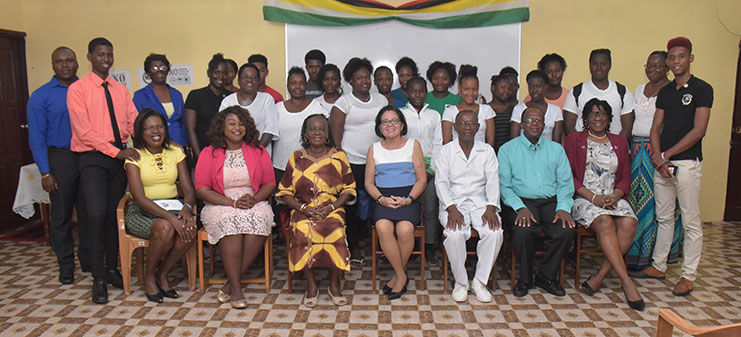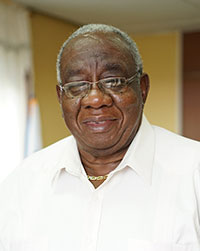EDUCATION plays a critical role in tackling youth unemployment and while job creation is fundamental, the development of a qualified workforce, ready to meet the developmental challenges of the country, is critical if young people are to be employable and mobilised to take advantage of entrepreneurial opportunities.
Last week in Government in Action, we took a look at the Government’s efforts aimed at not only creating jobs, but the promotion of agro-processing and entrepreneurship and the opportunities and financial support available for young entrepreneurs, particularly at the Small Business Bureau (SBB) and through other programmes facilitated by the various Ministries.

In this week’s Government in action, we will take a look at the Government’s efforts in promoting vocational education as a means of empowerment and independence for the youth population.
President Granger has time and time again lamented the significant issue of school dropouts, pointing out that an average of 4000 children drop out of school each year and of those who do complete school, many do not matriculate or achieve enough passes to make them employable. “Education is one of the state’s most important functions. Education unlocks opportunities for young people who must be prepared to grasp opportunities for self-employment. They must be educated if they are to improve their performance and acquire the correct attitudes, values and skills to secure employment,” he said.
Empowerment through education

While training and vocational education will no doubt empower a generation of talented young people, who just needed a second chance, the administration has demonstrated that it is interested in inculcating a culture of education and entrepreneurship. In this regard, programmes have been developed to provide the necessary support for budding entrepreneurs, while others focus on skills training to aid in employment ability.
In his 2018 Budget presentation to the National Assembly, Minister of Finance, Mr. Winston Jordan said that the Government acknowledges that youth represent a significant proportion of Guyana‘s population and that the future success and growth of Guyana depends on how equipped this section of the population is to handle emerging and future challenges. The Government, he said, stands resolute towards ensuring that concerted efforts are made in satisfying the needs of young people. In this regard, Government‘s approach to the development of our young people is based on the twin pillars of youth empowerment; and youth employment and entrepreneurship.
“In relation to Youth Employment, several initiatives have been, and are currently being, rolled out to ensure that our young people are gainfully employed in environments where their skill sets can be readily applied, and where they can make meaningful contributions. The Youth Innovation Project of Guyana (YIPoG), Youth Entrepreneurial Skills Training (YEST), Sustainable Livelihood and Entrepreneurial Development (SLED) Programme, and the Hinterland Employment and Youth Scheme (HEYS), are programmes designed to ensure that youth attain the relevant skill-set that is required for the job market, either to become employable or be their own bosses. Taken together, in 2018, Government will be investing over $1.7 billion on youth programmes,” Minister Jordan said.
One such initiative which looks at vocational training is the Hinterland Employment Youth Service (HEYS), which was launched in October 2016. This is an exchange programme where persons teach, discuss, learn and exchange experiences and knowledge in order to improve their standard of living and contribute positively to the development of their communities.
The programme includes training and capacity-building in several key areas including plumbing, carpentry, sewing and wiring among many other vocational areas. It targets 2000 youth in 106 communities across the hinterland regions and is in keeping with President Granger’s promise of improving lifestyles and standards of living for youth and young adults who reside in the hinterland.
Then there’s the Youth Innovation Project, which seeks to engender creative thinking amongst youth, and provides grant resources up to $2 million to finance innovative solutions. In and out of school youth, between the ages of 16-35, are benefitting from this programme.
“The project, which operates under the theme, ?Aspire, Inspire to reach?, was designed to decrease unemployment among youth; engage youth in the development of a green state; and foster creative thinking for problem solving through Science, Technology, Engineering, Agriculture, Anthropology, Archaeology, Architecture, Arts, Mathematics and Spirituality. In this regard, Government has invited youth to submit proposals for financing,” the Minister of Finance noted.
SUPPORTING THE YOUTH
It is imperative that the Government creates and maintain institutions, which can provide young people with vocational and technical skills that can make them marketable, thereby improving their quality of life. This is where the Board of Industrial Training plays a critical role.
Chairman of the Board, Mr. Clinton Williams, in an interview with the Public Information and Press Services Unit of the Ministry of the Presidency said that in addition to running an apprenticeship programme, since 2005 it has been offering training programmes in a number of areas, which caters to primarily vulnerable youths in society and school dropouts.
“That has in fact been our main focus; to train people with those skills that are required by the various sectors in the country. That programme has generated thousands of skills in various skills profiles. We categorise them as technical, commercial and clerical skills and so on, welding, fabrication, carpentry, mechanical engineering, and a whole host of other skills. We have been tracing what happened to those skills that we produce and also where they are employed and who employs them and so far, 65 percent of those we have trained are gainfully employed,” he said.
For the past 18 years, the organization has generated over 20000 artisans and semiskilled workers that have been added to the workforce. Additionally, the renewed focus of training implemented under the National Training Project for Youth Empowerment (NTPYE) programme has shaped the opportunity for the beneficiaries to gain entry into the regular programme of recognised Technical and Vocational Education Training (TVET) institutions, such as the Mahaicony Technical Vocational Educational Training Centre in Region 5 and the Leonora Technical and Vocational Training Centre in Region Three.
In 2016, 115 new apprentices were registered and assigned to four corporate entities, 103 apprentices were certified as artisans and 1430 youths were trained under the National Training Project for Youth Empowerment and were certified as semiskilled workers while 212 persons were certified as Heavy Duty Equipment Operators.
In 2017, 13 new apprentices were registered and assigned, 75 apprentices were certified as artisans and 1613 youths were trained under the National Training Project for Youth Empowerment and certified as semiskilled workers.
The Board has also worked alongside the Office of the First Lady to train students from villages in Regions 4 and 10 in information and Communication technology. The Chairman said that plans are in train to take the programme to other vulnerable communities across the country.
“We are very happy to work with her [the First Lady] to generate skills particularly in vulnerable areas, for out of school youths in communities that are considered to be vulnerable and we have done programmes in Region Four and this year we will be working in Agricola, Linden, Region Three and Region Nine and they are intended to satisfy some requirements to ensure employable skills and poverty alleviation and improve economic independence,” Mr. Williams said.
Mr. Williams explained that the certificates received by the students are regionally and internationally accepted and provides an opportunity for young people to not only be gainfully employed but to also become entrepreneurs.
“Our programmes are so intense in terms of the quality assurance that we believe that whenever we issue a certificate, then that certificate gains acceptance and recognition by a number of agencies and countries. We have now moved on based on an arrangement we have with the Caribbean National Training Agency (CANTA) and the Caribbean Community (CARICOM) Secretariat to now award the CARICOM Vocational Qualification (CVQ). All those programmes ultimately will have substantial marketability in the sense that we can use them to gain employment not only in Guyana but elsewhere so the recognition is assured,” he said.
For 2018, BIT plans to implement its NTPYE programme in 18 areas across the 10 administrative regions of Guyana in the areas of block making/masonry, boat building, electrical installation, Fitting Machine, Food Preparation, Garment construction, General Building Construction, Heavy Duty Equipment Operation, Information Technology, Motor Vehicle Repairs, Plumbing, Refrigeration/Air Condition, Small Engine Repairs, Supervisory Training and Welding and Fabrication.
Additionally, during the year BIT is scheduled to commence the implementation of training for the Basic Needs Trust Fund (BNTF) in Boat Building, General Building Construction, Heavy-Duty Equipment Operator Maintenance and Repair, JAWS Computer Training for Persons with Visual Disabilities, Small Engine Repairs and Solar Photovoltaic training in installation, maintenance and repair of Solar Photovoltaic equipment. These training programmes will be implemented in all 10 administrative regions and are expected to realise the empowerment of approximately 1400 persons.
The Board is also looking to partner with the University of Guyana to accept the students exiting its training programmes since they are brought up to the entrance level requirements through the rigorous training programmes.
These initiatives are geared towards moulding the future of Guyana and reaffirm the government’s commitment towards ensuring ‘a good life for all’ through education, employment and enterprise. The President believes that such initiatives help in overcoming the problem of unemployment and will also help to create a generation of young people who will become the new entrepreneurial class, putting the country well on its way to reclaiming its former glory as “breadbasket of the Caribbean” and where every citizen can indeed enjoy the good life in keeping with the country’s motto: “One people, One nation, One destiny.”




.png)









